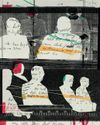
In June, the small left-wing magazine -Jewish Currents summoned its donors and close confederates to a private event in a penthouse apartment on the Upper West Side of Manhattan. Kathleen Peratis, a stylish human-rights advocate who co-chairs the publication's board, pressed refreshments on the guests with the warm, fluttering anxiety of a doting Jewish grandmother. This particular crowd, especially since October 7th, isn't often the beneficiary of such Jewish hospitality, and a few attendees sparred amiably about who among them was the most despised within the broader community.
The magazine's most prominent contributor is Peter Beinart, an observant Jew whose public opposition to a Jewish state has rendered him a moral hero to some and a turncoat to others. A few years ago, Beinart recalled, he turned on his computer after Yom Kippur, a day on which observant Jews abstain from electronics, to find an e-mail calling him a self-hating Jew. He said, with boyish good cheer, "Imagine considering me such a bad Jew that you feel compelled to tell me in a way that desecrates the holiest day of the Jewish calendar." The featured guest was the Haaretz columnist and reporter Amira Hass, the rare Jewish Israeli journalist to live in the Palestinian territories-previously in Gaza and now in the West Bank. Hass spoke for almost two hours, and no one so much as glanced at a phone. Her mother, Hass recalled, had been shocked to read in one of Simone de Beauvoir's memoirs a passage about a pleasant bike ride in the mountains during the Second World War when Hass's mother was in the Bergen-Belsen concentration camp.
This story is from the September 16, 2024 edition of The New Yorker.
Start your 7-day Magzter GOLD free trial to access thousands of curated premium stories, and 9,000+ magazines and newspapers.
Already a subscriber ? Sign In
This story is from the September 16, 2024 edition of The New Yorker.
Start your 7-day Magzter GOLD free trial to access thousands of curated premium stories, and 9,000+ magazines and newspapers.
Already a subscriber? Sign In

GET IT TOGETHER
In the beginning was the mob, and the mob was bad. In Gibbon’s 1776 “Decline and Fall of the Roman Empire,” the Roman mob makes regular appearances, usually at the instigation of a demagogue, loudly demanding to be placated with free food and entertainment (“bread and circuses”), and, though they don’t get to rule, they sometimes get to choose who will.

GAINING CONTROL
The frenemies who fought to bring contraception to this country.

REBELS WITH A CAUSE
In the new FX/Hulu series “Say Nothing,” life as an armed revolutionary during the Troubles has—at least at first—an air of glamour.

AGAINST THE CURRENT
\"Give Me Carmelita Tropicana!,\" at Soho Rep, and \"Gatz,\" at the Public.

METAMORPHOSIS
The director Marielle Heller explores the feral side of child rearing.

THE BIG SPIN
A district attorney's office investigates how its prosecutors picked death-penalty juries.

THIS ELECTION JUST PROVES WHAT I ALREADY BELIEVED
I hate to say I told you so, but here we are. Kamala Harris’s loss will go down in history as a catastrophe that could have easily been avoided if more people had thought whatever I happen to think.

HOLD YOUR TONGUE
Can the world's most populous country protect its languages?

A LONG WAY HOME
Ordinarily, I hate staying at someone's house, but when Hugh and I visited his friend Mary in Maine we had no other choice.

YULE RULES
“Christmas Eve in Miller’s Point.”